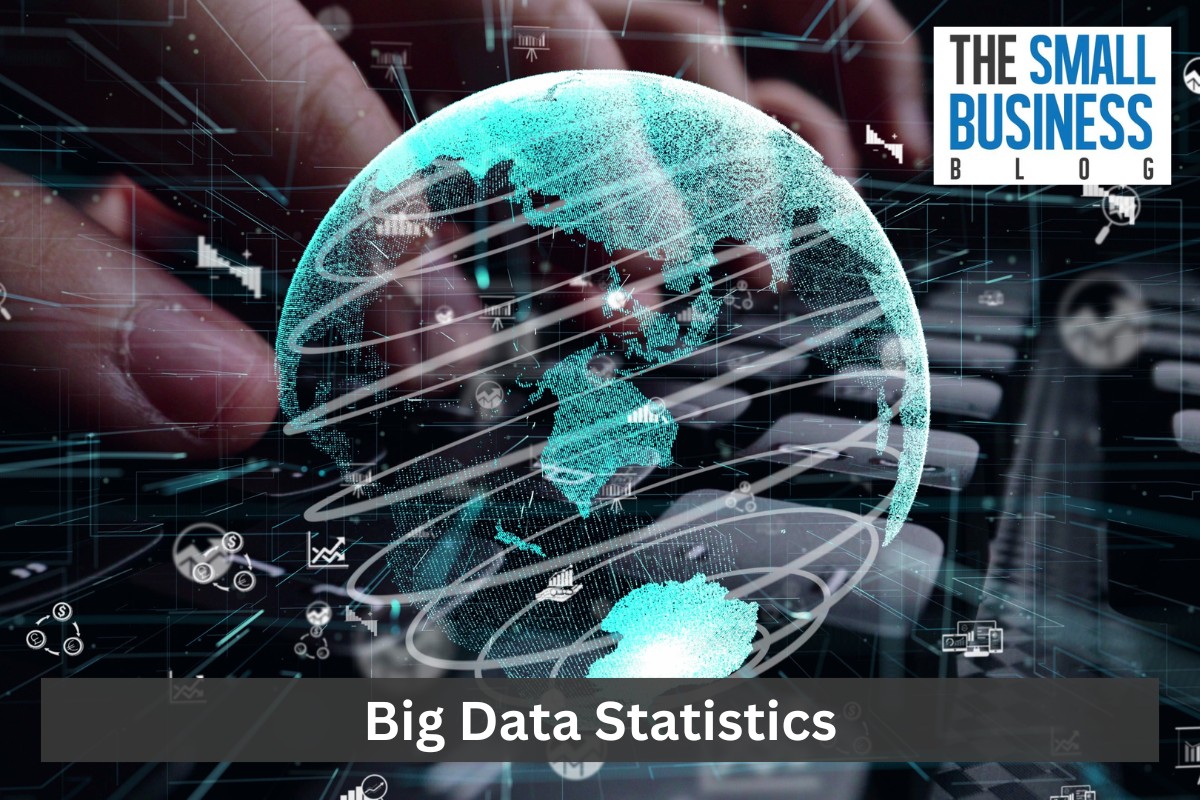Data has become the most valuable asset for any business.
It has always been used to help understand customer needs, the market, and even determine new products.
Today, thanks to the huge increase in reliance on digital technology, there are massive amounts of data available.
The data allows the analysis of customer behavior patterns, trends, the need for new products and services, and even how to cut costs.
The list of uses for modern data is almost endless.
However, there is so much data it can’t be processed in the way it used to be.
Hence the arrival of big data and the need to understand big data statistics.
There are approximately 8 billion people in the world and over 5 billion have access to the internet.
Each of those people enters various pieces of information into the web.
Every bit of information helps to create a profile that businesses can use.
Of course, with billions of people online entering hundreds of items of data a day, the total amount of data is trillions of gigabytes.
Storing all this data, processing it, and making sense of it is what the big data industry does.
It’s something it does surprisingly well and it will become increasingly important as the big data industry expands.
It’s time to be amazed by the top statistics of the big data industry.
Post Contents
- 1 Key Statistics
- 2 Top Big Data Statistics in 2024
- 2.1 1. Globally, The Big Data Industry Is Worth $274 Billion
- 2.2 2. 70% Of Data Is Created By People Using The Internet
- 2.3 3. Approximately 2.5 Quintillion Bytes Are generated Daily
- 2.4 4. The US Leads The Way In Big Data Spending
- 2.5 5. 27% Of Business Executives Believe Big Data Generates Profits
- 2.6 6. 50% Of US Executives See Money As The Biggest Issue To The Successful Use Of Big Data
- 2.7 7. 43% Of IT Decision Makers Believe Their Current Systems Aren’t Ready For The Future
- 2.8 8. Data And AI Professionals Earn, On Average, $146,000
- 2.9 9. Netflix Claims Big Data Saves It $1 Billion Every Year
- 2.10 10. Over 100,000 Google Searches Are Undertaken Every Second
- 2.11 11. 72% Of US Adults Are Concerned About Personal Data Usage
- 2.12 12. By 2025 Over 55 Billion IoT Devices Will Be Connected
- 2.13 13. It Would Take 180 Million Years To Download All Internet Data
- 2.14 14. 80% Of Businesses Recognize Most Of their Data Is Unstructured
- 2.15 15. 98% Of IT Professionals Believe Data Analysis Should Be Urgently Increased In The Next 1-3 Years
- 2.16 16. 1 GB Of Data Creates 350,000 Emails
- 2.17 17. Globally, $1 Million Is Spent Every Minute On Online Shopping
- 2.18 18. 4 Billion Videos Are Uploaded Daily To Facebook
- 2.19 19. 50% Of All Corporate Data Is Stored In The Cloud
- 3 Summing Up
Key Statistics
- Globally, the big data industry is worth $274 billion
- 70% of data is created by people using the internet
- Approximately 2.5 quintillion bytes are generated daily
- The US leads the way in big data spending
- 27% of business executives believe big data generates profits
- 50% of US executives see money as the biggest issue to the successful use of big data
- 43% of IT decision makers believe their current systems aren’t ready for the future
- Data and AI professionals earn, on average, $146,000
- Netflix claims big data saves it $1 billion every year
- Over 100,000 Google searches are undertaken every second
- 72% of us adults are concerned about personal data usage
- By 2025 over 55 billion IoT devices will be connected
- It would take 180 million years to download all internet data
- 80% of businesses recognize most of their data is unstructured
- 98% of IT professionals believe data analysis should be urgently increased in the next 1-3 years
- 1 GB of data creates 350,000 emails
- Globally, $1 million is spent every minute on online shopping
- 4 billion videos are uploaded daily to Facebook
- 50% of all corporate data is stored in the cloud
Top Big Data Statistics in 2024

1. Globally, The Big Data Industry Is Worth $274 Billion
Over the last twenty years the big data industry has been steadily increasing in value.
At first the industry grew slowly as big data wasn’t that big and people became accustomed to what this amount of data could do for them.
In recent years the climb in worth has been much faster.
Today, it’s estimated the big data industry is worth $274 billion and is likely to keep growing.
In 2018 it was worth $169 billion. That means it has achieved a 62% rate of growth between 2018 and 2022.
A huge part of this worth is the amount of revenue the industry can create.
Big data revenue was approximately $60 billion, in 2019.
Current estimates suggest it will be double that, around $120 billion by 2027.
(SiliconAngle)
2. 70% Of Data Is Created By People Using The Internet
You generate data when you open your browser, log into your accounts, add a social media post, or do literally anything online.
Every search, query, or piece of information you share is a bit of data.
Search engines use this to create profiles of you.
This includes your personal preferences and a huge array of other information.
Profiles can be sold to companies, allowing them to identify your needs and target you with offers.
It’s all a result of data input by individuals.
According to the latest research a staggering 70% of all online data is user-created.
In other words, you’re giving companies your data simply by using the internet.
Still not convinced?
Consider this, 66,000 photos are shared via Instagram every 60 seconds, 1.7 million pieces of content are posted to Facebook every minute, and 231 million emails are sent every minute.
Amm of this is data and it’s collected to help businesses target customers better.
(Baseline)
3. Approximately 2.5 Quintillion Bytes Are generated Daily
The 2020 PWC figures show that there are over 44 zettabytes of data in the digital universe.
A zettabyte is the same as one trillion gigabytes.
It’s an incomprehensible figure.
It’s worth noting there were 4.4 zettabytes of data in 2019.
The amount jumped tenfold in just one year, imagine how much data there will be in 2025 or 2030.
While it’s difficult to predict the exact big data growth rate, a survey by LinkedIn suggested that 2.5 quintillion bytes of data are being created every day.
That’s simply a result of individuals and internet usage.
That’s over 900 quintillion bytes in a year.
To help you understand the size of this number, 1 quintillion is a one, followed by eighteen zeros.
(PWC/LinkedIn)
4. The US Leads The Way In Big Data Spending
This isn’t a surprising fact.
In general the US leads the way in all technological markets, big data is no different.
According to the latest data by IDC the US has a 51% share of the big data and analytics solutions market.
The US is heavily invested in collecting and utilizing data to improve customer interactions, product creation, and even business efficiency.
It’s an approach which is currently working.
The latest figures show that businesses in the US spent $110 billion on big data in 2021.
That’s nine times more than Japan, which spends the second most on big data globally.
Japan businesses spent $12.4 billion on big data in 2021 and China spent $11.9 billion.
(IDC)
5. 27% Of Business Executives Believe Big Data Generates Profits
Capgemini conducted a survey across 210 executives, approximately 50% of which were US-based and the other 50% in Europe.
Of all the professionals asked, 27% believed that big data was instrumental in increasing their profits.
A further 45% confirmed the results of big data covered the associated costs.
They effectively ‘broke even’, but were confident this would change for the better in the future.
Just 12% of those surveyed confirmed losses in the costs versus rewards of using big data.
(Capgemini)
6. 50% Of US Executives See Money As The Biggest Issue To The Successful Use Of Big Data
Money makes the world go round and a lack of it always causes issues.
This is certainly true as far as US executives are concerned.
The latest survey by Capgemini found that 50% of US executives were concerned about budgets, believing they were restricting their ability to use big data properly.
Interestingly, only 39% of European executives felt the same way.
However, all agreed that big data was essential for a profitable business.
Alongside funding, IT executives were most concerned about data security, integration, and the proliferation of silos.
They were also worried that the current level of technical expertise is insufficient for future needs and there are not enough freshly qualified IT professionals with the needed knowledge.
(Capgemini)
7. 43% Of IT Decision Makers Believe Their Current Systems Aren’t Ready For The Future
IT professionals have a difficult job.
They need to offer the best possible computer networking and infrastructures on the smallest possible budget.
It’s a constant battle and one that big data has made much more difficult.
Big data centers handle the processing of data but companies need to be able to upload and download the relevant data.
This allows them to build profiles and use the data to better target their customers.
The problem is that big data is growing rapidly.
In order to manage it for the business IT professionals will need to instigate a variety of systems, such as machine learning, 5G, and even edge computing.
It’s a massive overhaul of IT systems.
Unfortunately, 43% of IT professionals feel that their current systems won’t be able to handle the amount of data available in the near future.
Systems need to be upgraded today but that involves financial commitment from businesses, not all of which are able to.
That’s why 43% of IT decision-making professionals are concerned.
(Dell Technologies)
8. Data And AI Professionals Earn, On Average, $146,000
Because big data offers companies big money it’s not surprising that anyone involved in the industry is being well-rewarded.
Especially data professionals.
The latest research shows that data professionals and those involved in AI earn, on average, $146,000 a year.
It’s a healthy wage and a reflection of the importance of data in the modern world, as well as the growing influence of AI.
However, it’s worth noting that data and AI professionals have only seen a salary growth of 2.25% per year for several years.
That’s significantly less than inflation, illustrating that these professionals are technically worse off each year.
(O’Reilly)
9. Netflix Claims Big Data Saves It $1 Billion Every Year

Big data is a powerful tool for businesses.
It allows them to identify trends, market preferences, and create the corresponding service/product.
This is perfectly evidenced by Netflix.
According to an Inside Big Data Survey, Netflix saves $1 billion every year.
This is done via big data and algorithms that identify what content is being watched on their channel.
With this information Netflix can make programs that people want to watch, saving themselves money on unwanted and unneeded content.
Big data clearly works as Netflix has saved billions with its help.
(Inside Big Data)
10. Over 100,000 Google Searches Are Undertaken Every Second
There are over 5 billion active internet users.
Every day many of these users search for information using search engines.
As one of the best-known, Google is a consistent choice for locating information.
It has a 91.9% share of the search market, explaining why it is the most common choice.
Individuals across the globe create an impressive 100,000 searches every second.
That’s the equivalent of 6 million searches every minute or 360 million every hour!
The internet is literally used for everything, to find a local store, order a much-needed component, or search for friends.
In fact, the latest research shows the average user spends nearly 7 hours a day online and the average time is increasing by four minutes daily!
In short, the number of searches and therefore the amount of data, will keep growing.
(Internet Live Statistics)
11. 72% Of US Adults Are Concerned About Personal Data Usage
Because trillions of pieces of data are constantly being uploaded businesses have access to far more data than ever before.
It’s more than just information about customer trends or product issues.
This data can identify individuals’ internet activity, preferences, and a host of other personal details.
In short, it’s a potential invasion of privacy.
Couple this with concerns over the data falling into the wrong hands and it’s little wonder that 72% of adults feel businesses have too much control over personal data.
There have been numerous security breaches in recent years where thousands of people’s profiles have been stolen.
Each individual is instantly at risk of their accounts being hacked or even their identity stolen.
It’s not surprising most people don’t trust big data and the businesses that use/store data.
(YouGov)
12. By 2025 Over 55 Billion IoT Devices Will Be Connected
The Internet of Things refers to any device that is connected to the internet.
These types of devices are extremely popular as you can control anything from your phone.
For example, your heating and lights can be operated while you’re still at work, doorbell cameras are becoming the norm, and voice-operated systems are available to answer any question you have.
As the IoT becomes increasingly popular there will be a dramatic rise in the number of connected devices.
Current estimates suggest that there will be 55.7 billion devices connected to the internet by 2025.
These devices will create approximately 80 zettabytes of data
(Statista)
13. It Would Take 180 Million Years To Download All Internet Data
To give you a quick idea of how much data is online, the current estimate states it would take over 180 million years for one person to download all the data online.
That’s not as much time as it would take to read it or even understand it!
(Statista)
14. 80% Of Businesses Recognize Most Of their Data Is Unstructured
Although businesses are increasingly aware of the importance of big data, they are not yet fully equipped to handle it.
Recent figures from Statista suggest that approximately 80% of all businesses don’t have faith in their own data.
The data has been collected properly, but IT professionals estimate between 50%-90% of the collected data is not properly structured, making it difficult to use.
This covers all types of data, including text, videos, and even social media activities.
In short, businesses need to invest to improve the structure and therefore usefulness of big data.
(Statista)
15. 98% Of IT Professionals Believe Data Analysis Should Be Urgently Increased In The Next 1-3 Years
This statistic isn’t surprising when you consider how rapidly the big data industry is growing and the concerns of IT professionals regarding funds and necessary qualifications/experience.
The bottom line is surprisingly simple, if there isn’t an increase by businesses in data analysis they will find it much harder to compete with the competition.
In 2022 the top focus of big data investment was modernizing data and moving it from legacy systems to the cloud.
This is a good first step.
However, the majority of IT professionals don’t feel it is enough, the way data is analyzed and how it is utilized needs to be improved dramatically and quickly.
(Ocient)
16. 1 GB Of Data Creates 350,000 Emails
Talking about big data doesn’t necessarily make it easier to understand the figures being used and just how much information is available.
It can help to understand that one gigabyte of data can create 350,000 emails.
Alternatively, 1 gigabyte of data will handle 30 hours of Skype voice calls or 4 hours of Skype video calls.
You can download between 25-30 app updates with one gigabyte of data, stream 30 minutes of HD-quality video, or two hours of SD streaming.
One gigabyte is enough to browse 3,000 web pages or upload 300-400 pictures to social media.
It can even handle 50 minutes on Instagram Reels.
Now imagine a one with twelve zeros after it, that’s how many gigabytes are in just one zettabyte!
(Statista)
17. Globally, $1 Million Is Spent Every Minute On Online Shopping
Every shopping transaction is composed of thousands of pieces of data.
There’s the time of purchase, product being purchased, location, payment method, your personal name, address, and other contact details, and many more elements essential for the purchase to be completed.
Now consider how many products can be purchased with $1 million.
That’s how many transactions are created and the associated data.
That level of data creation is happening every minute of the day.
It shows why the big data industry is so large and why businesses need to be online to be successful.
It’s worth noting that 43% of online sales now start via social media.
(Earthweb)
18. 4 Billion Videos Are Uploaded Daily To Facebook
Facebook has over 3 billion customers and is currently the largest social media site on the web.
While it has over 3 billion registered users, not all of them are online every day.
It’s estimated that 1.91 billion people are using Facebook daily and that the average person spends nearly two-and-a-half hours on Facebook daily.
During that time, approximately 4 billion videos are viewed and 500 million users watch videos.
It’s a total of 100 million hours a day and 65% of this viewing is via a smartphone.
It’s estimated this activity creates 4 petabytes of data every day.
One petabyte is the same as just over a million gigabytes.
(Earthweb)
19. 50% Of All Corporate Data Is Stored In The Cloud

A survey of businesses in 2021 found that many were already embracing the power of the cloud.
In fact, half of all the corporate firms surveyed were storing data on the cloud.
This figure is likely to increase as big data gets larger.
It’s simply too expensive to purchase the servers and associated software to manage all data in-house.
The most cost-effective solution is to use cloud storage, that’s why 50% of corporate businesses are already doing so and more will follow.
Of course, cloud-based data storage should be more secure and easier to access, making it an attractive and cost-efficient solution for all businesses.
(Earthweb)
Summing Up
The big data statistics don’t just show how important big data has become to businesses.
These statistics also illustrate the sheer size of the big data industry.
You may never have heard of petabytes or quintillions before, they are ridiculously large numbers.
Yet, they are increasingly commonly used, showing how fast the internet and the associated data is growing.
This growth rate will continue as people will keep generating data.
Purchases, social media posts, marketing, advertisements, and so much more.
They are all ways to generate data and things that internet users are not about to give up.
If you’re in any type of business it’s time to consider your data, how to secure it, and how to maximize your use of big data to generate additional profit.
Of course, it’s essential that you consider the security and the reputation of any data storage solution.
Even a small data breach can have serious negative repercussions for your business.
It’s essential to maintain public trust.






























